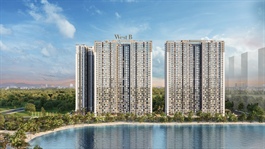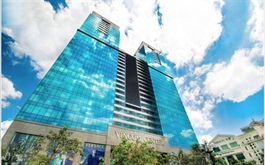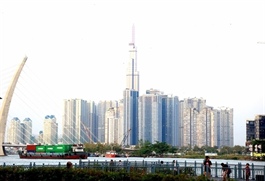Supply shortages remain in industrial property frame
Supply shortages remain in industrial property frame
New supply in the industrial real estate market will slow in the second half due to the influence of legal procedures as well as a decrease in demand from the manufacturing industries.
According to a report by Cushman & Wakefield released last week, the industrial real estate market in the south, specifically key areas such as Ho Chi Minh City, Binh Duong, Dong Nai, Long An, Ba Ria-Vung Tau, did not have any launches planned in Q2.
“Slow compensation processes and legal procedures are considered the cause of the shortage of new supply. By 2024, it is forecast that there will be about 1,800 hectares of new industrial land, mainly concentrated in the southern provinces of Binh Duong, Dong Nai, and Long An,” said Bui Trang, country head of Cushman & Wakefield in Vietnam.
Despite the slowdown in global economic growth, the market still saw a lot of demand for industrial zone (IZ) land in the south, with net absorption of more than 70 ha for new projects and capital increase in the first half of the year.
The industrial real estate market lacks new supply in the last months of the year, photo:baotainguyenmoitruong.vn
“By 2026, industrial real estate will have an additional 1.3 million sq.m of warehouse, with an annual growth rate of 5.1 per cent. The market by then will become more competitive and investors may have to come up with more attractive rental policies and incentives to draw tenants,” Trang said.
Dong Nai province has 40 IZs with a total area of nearly 19,000 ha approved by the government. Some 32 of them were put into operation with an occupancy rate of around 90 per cent.
Eight others are in the pipeline but still facing legal procedures, so industrial property available for lease is increasingly scarce.
Shortage of land creates issues for large-scale manufacturers. Lego Group waited for three years for approval for a large enough land space and moved to Binh Duong province instead, despite the group planning to invest a billion dollars in Dong Nai first.
Nguyen Huu Nguyen, director of Dong Nai Department of Planning and Investment, said that the province was aiming to entice investment in eco-friendly economic projects that take up less land and labour to move towards a green industry.
“The construction of ring roads 3 and 4 as well as Bien Hoa-Vung Tau Expressway are also being implemented to create a unique attraction for the province. Dong Nai province has come up with a number of solutions, such as setting up a working group to take notes at each locality to solve problems in new industrial property projects,” he said.
Meanwhile, Huynh Thanh Chung, general director of Minh Hung-Sikico IZ in Binh Phuoc province, said that it was a place with great potential and advantages, but the available land was limited.
“Although more land is wanted to develop the IZ, everything is still based on the government’s target and the local allocation,” Chung said.
Ho Chi Minh City has also requested adjustment of the planning of IZs, supplementing Pham Van Hai 1 and 2 IZs with 600 ha to the province’s master plan.
According to VNDirect Securities, limited supply will shape two shifting trends in the near future. Firstly, investors are gradually turning their attention to the tier-2 market, with great advantages. The tier-2 market offers more competitive rates thanks to the relatively large difference between the tier-1 and tier-2 rental rates, both north and south.
In addition, the available land in tier-2 offers more options for tenants, especially as traffic connectivity is increasingly improved. In addition, labour costs are also lower than in tier-1. Also, the connectivity between the two markets has been improved thanks to an upgraded infrastructure network, VNDirect said.

























